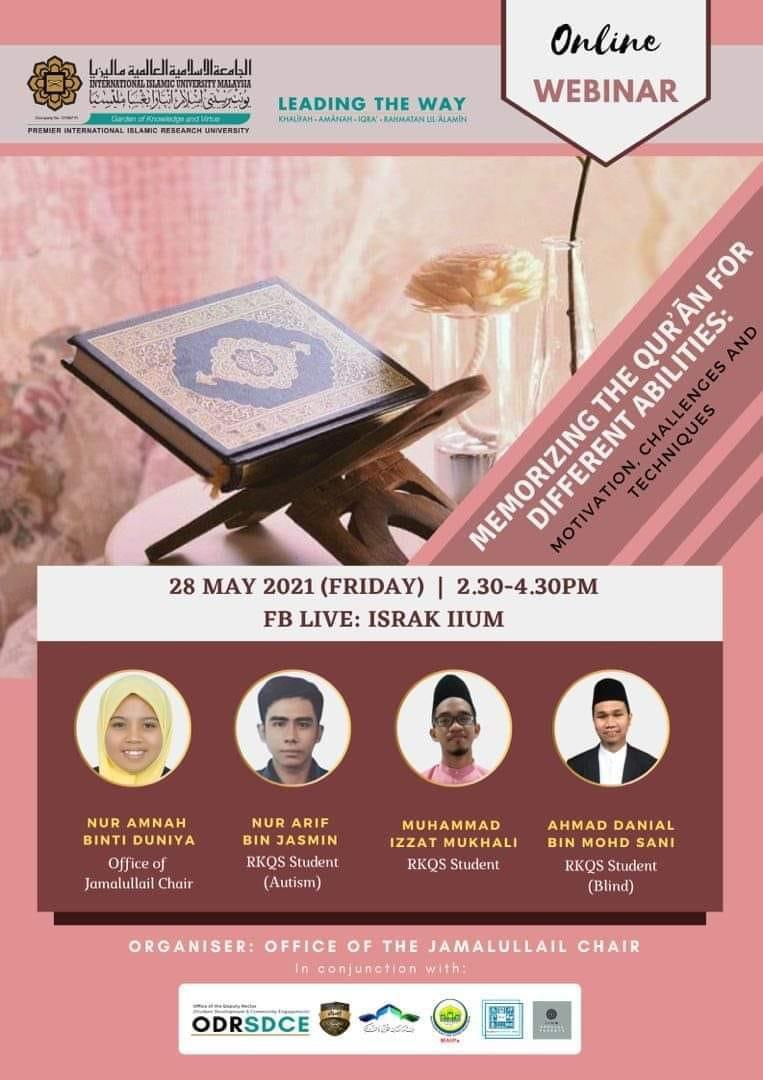By Maryam Iman Binti Norhashimi
A webinar entitled “The memorisation of Quran for different abilities: Motivation, Challenges and Techniques” recently highlighted the process of memorising the Quran by students of the Department of Qur’an and Sunnah Studies (RKQS) rather than focusing on the hardships they went through as speakers.
“Repetition is the recipe for accomplishment,” Muhamad Izzat, 24, told the webinar when discussing his motivation in memorising the Quran.
He therefore encouraged people to set an idol as an example because “that helps as a magnet to pull us towards improvement”.
“Normally, people with perfect sensuous have difficulties in using off their senses to advantage,” Muhamad Izzat said.
Representing the majority, Muhamad Izzat pointed out that the crux appears when people start thinking it is okay to do maksiah as long as their memorisation stays superb.
This state of thinking is the greatest friction to fulfilling our amanah as Muslims because what is haram is haram in Islam, he said.
Despite living in total darkness with both eyes shutting the lights, another speaker, Ahmad Danial never gives up on setting his heart ablaze as success mainly comes from the truest hard work and dedication.
In his younger days, the thought of joining Quran memorisation competitions already sounded inspiring to him to involve more in the memorisation system.
The boon towards Danial’s success is not only from his parents and teachers who taught him using brailles code for reading but also came from his friends who understood him during his school days.
Another speaker, Nur Arif said his motivation comes from his experience as an autistic child who had always spent most of his time memorising the Quran. Unlike other children, he played in his own world making use of his photographic memory to memorise the verses or surahs in just five minutes.
Nur Arif might be struggling in normal conversation but in class, he takes lecture-student communication as a practice especially when the lecturer asked him to continue his or her Quranic recitations. Additionally, he appreciates the dialogues in the Quran as a form of therapy to enhance his communication skills.
In the case of Ahmad Danial, he did not grow up in an Arabic speaking environment, hence becoming a challenge for him when he decided to learn Quran. Furthermore, using Braille Quran is not an easy option too, thus he chose to use Quran audio alternatively.
Meanwhile, ‘sensory overload’ is somewhat affecting the memorisation of an autistic person like Nur Arif the most. “Too much input breaks down to unnecessary repetitive behaviour like walking and spinning in rotation,” he added. Also, moving on from one juz to another is a challenge to him as it requires extra concentration especially for an autistic person.
Techniques to Boost Memorisation of Quran
Generally, it is recommended to divide the Quran into three levels; easy, medium and hard. These levels require a different duration of memorisation. Therefore, one should prioritise more on the difficult or unfamiliar part of the Quran than the other.
“It is also important to look for a good environment that helps with total concentration,” Izzat further emphasised.
Danial also suggested for memorisation to be done in Tahajjud prayer or in any other prayers. Moreover, a healthy diet helps with rightful minds too.
To top it off, Arif indicated the significance of understanding the meaning of the Quranic verses together with tadabbur and taking it into daily practice.
Overall, it was a very successful and insightful webinar with enlightening information from all the speakers. All Muslims have the right to memorise and study Quran in spite of wall of challenges that transpired.
The webinar was organised by the Office of Jamalullail Chair in collaboration with Islamic Revealed Knowledge Students’ Association (ISRAK), Kulliyyah of Islamic Revealed Knowledge and Human Sciences (KIRKHS), IIUM Special Parents, Disability Services Unit (DSU), and Office of the Deputy Rector, Student Development and Community Engagement (ODRSCE).***
